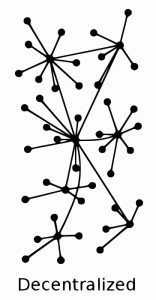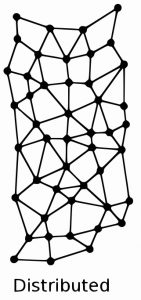Decentralization is our theme for 2018. The word has rebellious and transformative connotations, stemming from the sometimes turbulent devolvement of historically central-held power over property, wealth and justice to regimes of democratic government, a right to work and workers rights, and equal access to justice. More recently we have seen a grassroots reaction against corporate globalization and centralized politicization in the form of Brexit and a resurgence of nationalist political parties with protectionist policies in many countries. Decentralization is at the heart of the disruption we have seen brought about by new companies utilizing mass, personal connectivity in many business and industry sectors to let us transact directly with each other rather.
This has had a clear impact on many businesses that continue to operate in a traditional ‘pre-smartphone’ manner. Others have gone beyond creating an external market connecting suppliers/ sellers with users/buyers at an individual level, and have decentralized internally. This involves stripping out hierarchies, taking specialist functions out of silos and putting in place a work system of self-managing, cross-discipline teams where each team is assigned specific corporate functions. It’s not new, it was pioneered as The Lattice Organisation in the 1970’s. Though it is more relevant today as the mass of information that’s available has to be acted on faster than decision-making allows if communications have to go up and come back down chains of command, and through formal protocols to involve other departments.
So 40 years later, prominent business leaders of the new generation are again following the Lattice structure. Through an internal email to all Tesla staff, Elon Musk shows that he agrees managers add little or no value to pushing great ideas forward, and are actually instead more likely to slow down innovation, communications, and production.
At online shoe retailer Zappos, CEO Tony Hsieh stripped out the entire managerial systems in a process referred to as holacracy. 82% of staff stayed rather than take a severance deal, and he said afterwards his one wish was he had done it earlier.
Although many other organizations still retain an overall management system, they have eased head office protocols to adopt open-innovation techniques. Companies prompt and provoke ideas and solutions from their entire workforce rather than a specified R&D Department, or maybe even from an even wider field of individual experts in a sector. GE is a major organization at the leading edge of using open-innovation to provide its clients with the solutions they seek through GE GENIUSLINK. NASA casts it net further and gains valuable benefits through operating a series of challenges with financial rewards for the public at large under its NASA Solve programme in partnership with the gig-economy platform Freelancer.
 These are all examples of decentralization where businesses have moved away from reliance on a core set of providers to go to a larger crowd of some sort.
These are all examples of decentralization where businesses have moved away from reliance on a core set of providers to go to a larger crowd of some sort.
This is our current decentralized state that is moving from early-adopter stage and going mainstream. Decentralization does not mean it is a perfect system, actually it means restructuring existing organizational structures (as previously mentioned), and while we are restructuring we will see tension – maybe not all employees will accept change like they did at Zappos – and the fall of some large establishments.
 Decentralization will not be an end in itself. It will be a vital stepping-stone on the only route for us to enter a new distributed state of the so-called “perfectly efficient system.” We won’t see this happening immediately but it’s likely in a 5-7 year timeframe and we will more widely experience it from around 2025 onwards.
Decentralization will not be an end in itself. It will be a vital stepping-stone on the only route for us to enter a new distributed state of the so-called “perfectly efficient system.” We won’t see this happening immediately but it’s likely in a 5-7 year timeframe and we will more widely experience it from around 2025 onwards.
But wait! What about blockchain? It is a decentralized, irrevocable system that records information on multiple computers and as such cannot be modified by any individual. It thus has the potential to not only bring disruption to more business and industry sectors, but also to disrupt the first wave of disruptors as well.
Vitalik Buterin, the founder of Ethereum, has himself gone on record on the benefits of decentralized and distributed systems. He observes three key benefits of either form: systems are far less likely to fail; they are more resistant to attack; and collusion between a group of users to take advantage of others isn’t possible.
So what’s in store for us? Slock.it, as an example, is developing an app leveraging the Ethereum blockchain. By connecting individual items to a Universal Sharing Network (making them ‘smart’), and providing them with wallet functionality to enter contracts and resolve transactions when completion is recorded on the blockchain, it will make it possible to rent, sell or share any smart object such as cars, homes, white goods, pleasure craft, whatever, by contacting the item itself. This will disrupt iconic first-wave incumbents of the sharing economy such as Airbnb and Uber by:
- Making trusting the other party as unnecessary as possible
- Handling secure direct P2P payments
- Enabling users and owners to find each other with no actual meet required to hand over keys
Through greater transparency there is less need for trust, or for any sort of a relationship other than a transactional one which will be automated at arm’s length. There will be no central computer to hack into, items cannot be rented by deceit, historical records cannot be changed, there will be no downtime and it can be audited by anyone. In the age of the Internet of Things it will be possible for non-owners to gain access to items whenever they want them and for owners to earn an automated income from a multitude of underused assets.
In a distributed network era we may see fleets of autonomous vehicles with blockchain wired into them, automatically paying road toll charges, parking fees and for their electrical charging. Let the refrigerator send its own food order to the delivery company – and pay for it. There’ll be no point in anyone stealing any of your electrical equipment as they will be automatically immobilized. All achieved through flawless coordination around a shared blockchain. Decentralization will be the enabler.
These are the sorts of exciting developments and challenges that will be our focus in 2018, and in particular we will address how crowdsourcing is changing businesses, innovation and the future of work.
We look forward to you being a part of this journey alongside us. What’s your take on decentralization?





0 Comments